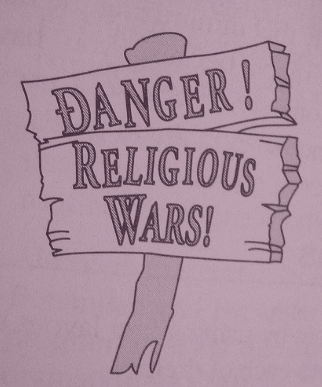
Religious Wars in Europe
Updated Oct 2023
As we forewarned years ago and have consistently addressed, the religious conflicts that we anticipated are now intensifying, poised to tear Europe asunder. The brewing tensions in the region are reaching a critical juncture, with significant implications for the stability of the continent. It is a situation that demands close observation and careful consideration in the days to come.
As we step back and examine the global landscape, it’s clear that the world has evolved significantly. The Syrian conflict, which once seemed an impossible crisis, has seen significant developments. The refugee crisis, a direct consequence of the war, has also evolved, with Europe’s response being a key factor in shaping the current situation.
The Syrian Conflict and Europe’s Role
The Syrian conflict, which began in 2011, has had far-reaching implications. Europe’s support for the U.S. intervention in Syria was a critical factor in the escalation of the conflict. This intervention, coupled with the subsequent attack in Libya, led to the displacement of millions of people, creating a refugee crisis of unprecedented scale.
However, as of 2023, the situation has changed. The war in Syria has de-escalated, and the refugee crisis, while still a significant issue, is being managed more effectively. Europe’s open-door policy, initially criticized for its lax checks, has been revised and strengthened. The continent has learned from its past and implemented more stringent checks and filters on refugee applications.
The Blame Game: A New Perspective
Global events, such as the Syrian conflict, involve a multitude of actors and factors, making it challenging to attribute responsibility to any single entity or government.
The interconnected nature of the world means that actions taken by governments, international organizations, and other stakeholders can have unintended consequences that reverberate across regions and impact various aspects of society, including conflicts and displacement.
Instead of solely focusing on blame, it is important to analyze the root causes, dynamics, and complexities of such situations. This includes examining the historical, political, economic, and social factors that contribute to conflicts and their subsequent consequences, such as the displacement of people.
By understanding the multifaceted nature of these events, we can work towards developing comprehensive solutions, promoting peace, and addressing the underlying issues that lead to conflicts and humanitarian crises.
Furthermore, fostering dialogue, cooperation, and collective responsibility among nations and stakeholders can be instrumental in finding sustainable solutions and preventing similar crises in the future. This includes supporting diplomatic efforts, humanitarian aid, and long-term development initiatives in conflict-affected regions.
Shifting the focus from blame to understanding allows for a more constructive approach to addressing global challenges, promoting empathy, and working towards a more peaceful and stable world.
The Rise of Religious Tensions: A Closer Look
It is positive to hear that, as of 2023, there has not been a full-blown religious war in Europe and that North Europe is being recognized for its emphasis on tolerance and integration. The situation regarding religious tensions and integration is complex and can vary across different regions and countries.
The refugee crisis did create challenges for Europe, including concerns about social cohesion, cultural integration, and the potential for increased religious tensions. However, it is important to note that the vast majority of refugees seeking asylum in Europe were fleeing conflict and persecution and were not themselves the cause of religious tensions.
European countries have made efforts to address these challenges and promote integration. Policies and initiatives aimed at fostering social cohesion, interfaith dialogue, and multiculturalism have been implemented in various countries. These efforts have sought to ensure that individuals of different religious backgrounds can coexist peacefully and contribute to society.
While religious tensions may still exist in certain instances, it is encouraging that Europe, particularly North Europe, is recognized for its commitment to tolerance and integration. These efforts can contribute to creating a more inclusive and harmonious society where individuals of different religious backgrounds can live side by side and engage in mutual respect and understanding.
It is important to continue promoting dialogue, education, and policies that foster social cohesion and address the root causes of religious tensions. By doing so, societies can work towards building a more peaceful and inclusive future.
If you have any further questions or need more information, please let me know.
The Religious Provocation Index: A Current Snapshot
Religious provocation and its associated conflicts and violence are complex and multifaceted issues that can vary greatly across different regions and periods. It is challenging to provide a definitive snapshot of the current situation worldwide. However, I can provide some general observations.
In recent years, there have been both positive developments and ongoing challenges in managing issues related to religious provocation in the United States and Europe. Efforts have been made to address religious discrimination, promote religious freedom, and foster interfaith dialogue and understanding.
In some cases, countries have implemented measures to enhance security, counter-radicalization, and prevent acts of violence motivated by religious extremism. Additionally, legal frameworks and policies aimed at protecting the rights and safety of individuals belonging to different religious communities have been established.
However, it is essential to note that challenges and incidents of religious provocation, violent attacks, and crimes can still occur. The nature and extent of these incidents can vary across different regions and are influenced by various factors such as socio-political dynamics, economic conditions, intergroup relations, and geopolitical factors.
Ongoing efforts are required to address the root causes of religious provocation, promote tolerance and respect for diversity, and ensure the protection of religious freedoms for all individuals. This includes fostering dialogue and education and promoting social cohesion and understanding among different religious communities.
It is worth noting that the situation can evolve, and it is vital to stay informed about the latest developments and trends through reliable sources and authorities specialized in monitoring and addressing issues related to religious provocation.
The U.S. Scenario: Law Enforcement and Public Sentiment
It is positive to hear that there has been a concerted effort in the United States to bridge the gap and foster a more harmonious relationship between law enforcement and the public. The dynamics between law enforcement agencies and the communities they serve are complex and can vary across different regions and communities.
Over the years, there have been increased calls for police reform, accountability, and addressing systemic issues within law enforcement. These calls have been driven by concerns about police practices, use of force, racial disparities, and the need to build trust between law enforcement and marginalized communities.
Efforts to address these issues have included policy reforms, training programs, community engagement initiatives, and increased transparency and accountability measures. These steps aim to improve the relationship between law enforcement and the public, promote fairness and justice, and ensure the safety and well-being of all individuals.
While tensions may still exist, the shift towards fostering a more harmonious relationship is a positive development. It is essential to continue the dialogue, maintain the momentum for change, and work towards creating a system that respects the rights of all individuals while ensuring public safety.
Learning from the past, adapting to new challenges, and striving for a more peaceful and inclusive world are indeed key aspects of progressing as societies. By acknowledging the complexities of our world and working together, we can make further strides towards building a more equitable and just future.
Religious Wars in Europe And The Religious Provocation Index
Our update frequency for the Religious Provocation index has notably decreased, reflecting a disturbing trend of unwavering intensity. There are no indications of any pullback, and the trend shows no signs of weakening. Our commitment to keeping you informed of emerging trends remains steadfast, as we do today.
The Unfolding Scenario: Escalating Violence
Regarding the state of violence in Europe and the United States, the outlook continues to darken, spiralling further downward. The eruption of a religious war in Europe is evident, with the ascent of far-right groups and the passing of increasingly brutal anti-immigrant laws. This, however, masks another insidious development: the introduction of equally severe laws that erode the remaining shreds of privacy for Europeans. The true threat, it appears, lies within the framework of their governments.
A Moment of Reflection
It is essential to avoid generalizations and examine the complexities and nuances of the issues.
While there may be individuals or groups who actively seek to exploit divisions and incite conflict, it is crucial not to attribute the actions of a few to an entire community or religion. It is essential to maintain a nuanced perspective and differentiate between the vast majority of individuals who seek peace and harmony and those who engage in reprehensible actions.
Addressing the challenges we face requires an understanding of the broader social, political, and economic factors that contribute to tensions and conflicts. These factors can include socioeconomic disparities, political instability, identity politics, extremist ideologies, and geopolitical dynamics.
By focusing on addressing the root causes and promoting dialogue, understanding, and cooperation, we can work towards building inclusive societies that uphold the values of tolerance, respect, and mutual understanding.
It is crucial to foster an environment where individuals from diverse backgrounds can coexist peacefully, appreciating the richness of cultural diversity while standing united against violence, discrimination, and extremism.
Unraveling the Chronology
The changes observed in Europe and the challenges faced in recent years are complex and multifaceted. It is crucial to examine the historical context and various factors contributing to the current situation. While I can provide some insights, it’s worth noting that this is a complex topic with differing perspectives.
The geopolitical landscape has changed significantly since the 1980s, 1990s, and early 2000s. The breakup of the Soviet Union conflicts in the Balkans and the aftermath of the September 11 attacks are some examples of key events that shaped the global dynamics during those times. These periods also saw different migration patterns and challenges, albeit distinct from the issues observed in more recent years.
The war in the Middle East, particularly the conflict in Syria that began in 2011, has had profound consequences, including a significant refugee crisis. The conflict has displaced millions of people, leading some to seek refuge in Europe. The influx of refugees indeed presented challenges for European countries in terms of managing the humanitarian crisis, ensuring security, and facilitating integration.
European countries have grappled with balancing providing asylum to those fleeing conflict and ensuring proper security measures. It is important to note that governments have implemented various screening and vetting processes to manage the arrival of refugees. While no method is foolproof, efforts have been made to verify the identities and backgrounds of those seeking refuge.
However, it is also essential to recognize that not all refugees who arrived in Europe during the crisis were from Syria alone. People fleeing conflicts and hardships from other regions, such as Afghanistan, Iraq, and various African countries, also sought refuge. The complexity of verifying individual backgrounds while ensuring humanitarian support adds to the challenges host countries face.
Public sentiment and perceptions regarding these issues can vary, and it is important to acknowledge different perspectives. Debates surrounding immigration, security, cultural integration, and the roles of governments in managing these challenges are ongoing.
Understanding the complexities and nuances of these issues is crucial for informed discussions and the development of effective policies to address the concerns of both host communities and individuals seeking refuge.
War and Its Financial Fallout: A Bleak Reality
The business of war, it’s a huge moneymaker. And it serves a dual purpose. Firstly, it diverts attention from the real issues at hand. Secondly, it enables select companies to rake in billions of dollars while drying the populace. Let’s take a look at how America fared after the Iraqi war. We were against that war from the get-go, stating right away that it was a bogus war with a hidden agenda and that it would achieve nothing. We openly disputed the original cost, which was $500 billion, arguing that it would cost ten times more. Since then, we’ve been attacking nation after nation, but the lifestyle of the average American has taken a serious hit. We’re on the brink of resembling a third-world country when it comes to wealth. To put things into perspective, the savings of the Top 100 CEOs now equal 41% of U.S. families.
Here’s a shocking statistic: the retirement savings amassed by just 100 chief executives equal the entire retirement accounts of 41% of U.S. families. That’s over 116 million people, according to a recent study. In this report, set for release today, the Center for Effective Government and Institute for Policy Studies found that the 100 most significant chief executive retirement funds are worth an average of about $49.3 million per executive, or a combined $4.9 billion. Topping the list is David C. Novak, the recently departed CEO of Yum! Brands Inc., with total retirement savings of $234.2 million. You can read the full story on Bloomberg.
Now, add to this the fact that over 60% of Americans have less than $ 1,000 in their savings accounts, and it becomes painfully clear that the American dream, as we once knew it, is fading. Working hard no longer guarantees success, and it’s a harsh reality that hard work no longer pays off as it should. The global outlook isn’t much better; many Europeans are toiling to make ends meet. In such an environment, resentment and anger can easily fester. The authorities are well aware of this, and they introduce the necessary elements to create a war when they see fit. It’s a troubling state of affairs that demands our attention and reflection.
Unraveling the Chain Reaction
No war in Syria= no Refugee Crisis.
The conflict in Syria has indeed been a significant factor contributing to the refugee crisis. The war, which began in 2011, has resulted in immense human suffering, displacement, and a large-scale refugee exodus.
The Syrian conflict started due to various factors, including political unrest, demands for democratic reforms, economic grievances, and the government’s response to peaceful protests. Over time, the conflict escalated into a complex and multifaceted war involving various armed groups, regional powers, and international actors.
The ongoing violence and insecurity in Syria have forced millions of Syrians to flee their homes, seeking safety and protection in neighbouring countries and beyond. The displacement of a large population has created one of the most severe refugee crises in recent history.
The ripple effects of this refugee crisis have been felt globally. The influx of Syrian refugees has put significant strain on neighbouring countries, such as Turkey, Lebanon, and Jordan, as well as on European countries that have received a large number of asylum seekers. The challenges of providing shelter, healthcare, education, and livelihood opportunities for refugees have been immense.
It is important to note that the refugee crisis is not solely a result of the Syrian conflict. Other factors, such as ongoing conflicts in other parts of the world, economic disparities, and political instability, have also contributed to the overall global displacement crisis.
Addressing the root causes of conflicts, promoting peacebuilding efforts, and providing humanitarian assistance to those affected are crucial steps in mitigating the refugee crisis. Additionally, international cooperation, burden-sharing, and long-term solutions that address the needs of both refugees and host communities are essential in managing the consequences of mass displacement.
The Refugee Crisis and Its Origins
The situation in Syria and its subsequent impact on the refugee crisis is indeed influenced by a complex chain of events involving various actors and decisions. The decision-making processes of countries, including European support for potential intervention in Syria, have played a role in shaping the course of the conflict.
Indeed, decisions made by different countries, including Europe and the United States, regarding potential intervention in Syria have had consequences in the region. However, it is essential to note that the Syrian conflict cannot be attributed solely to external factors or interventions. The conflict has deep-rooted internal causes related to political, social, and economic dynamics within Syria itself.
The conflict in Syria evolved from a series of complex factors, including domestic grievances, political repression, economic challenges, and the government’s response to peaceful protests. The escalation of the conflict and the involvement of various actors, both internal and external, have contributed to the displacement of millions of Syrians.
Furthermore, it is essential to recognize that the displacement crisis is not limited to Syria but is also influenced by conflicts and crises in other regions of the world. The displacement of people from Libya, for example, is a result of a separate conflict and political instability in that country.
While the decisions and actions of different countries can shape the course of conflicts, it is difficult to trace a direct causal link between a single decision or action and the entire refugee crisis. Multiple factors, including internal dynamics, geopolitical considerations, and regional dynamics, contribute to the complexities of conflicts and displacement crises.
Europe’s Open-Door Policy
The refugee crisis posed significant challenges for European countries, and their responses varied. While some European countries did provide assistance and support to refugees, it is important to note that the notion of an “open-door policy” can be an oversimplification of the situation.
European countries did face difficulties in managing the large influx of refugees, and there were instances where security checks may have faced challenges due to capacity constraints or logistical issues. However, it is crucial to avoid generalizations and recognize that the majority of refugees seeking protection were genuine individuals fleeing conflict and persecution.
It is also important to note that European countries have implemented various screening and vetting processes to ensure the security of their populations while providing humanitarian assistance to those in need. These processes aim to identify individuals who may pose security risks and separate them from genuine refugees.
It is worth highlighting that acts of violence or terrorism carried out by a small number of individuals claiming to be refugees should not be used to stigmatize or generalize the entire refugee population. Such incidents are isolated and should not overshadow the overwhelming majority of refugees who are seeking safety and protection.
While managing security concerns is important, it is equally crucial to uphold the principles of compassion, international law, and human rights in providing assistance to those in need. Striking a balance between security measures and humanitarian obligations remains a complex task for governments.
Efforts to improve screening processes, enhance coordination among European countries, and strengthen border management have been ongoing. The focus is to ensure both security and the provision of assistance to those genuinely in need of protection.
A Missed Opportunity for Stringent Screening
Had Europe implemented a more rigorous screening process, the situation might not have deteriorated to such an extent. However, this discussion, in the grander scheme of things, becomes somewhat moot because, as previously noted, the absence of a war in Syria would have prevented the refugee crisis from escalating to this level. In essence, the blame for this predicament falls squarely on two parties:
1. European governments.
2. The U.S. government for initiating a war with little hope of success and dragging Europe into the ensuing quagmire.
A Region in the Grip of Religious Conflict
At this juncture, the emotions of the masses have been ignited, and as history has shown, under such circumstances, rational thinking often takes a back seat. The recent NICE incident stands as a sombre declaration that Europe finds itself entrenched in a full-blown religious war. Consequently, violence is poised to surge at an unprecedented rate, with Northern Europe leading the charge in what we referred to as the “clash of civilizations” last year.
A Call for Preparedness
If you find yourself in Europe, it might be wise to consider self-defence training and learn how to protect yourself. Our religious provocation index continues to surge, reaching new highs every month without exception. Violent attacks, crimes, and antagonistic behaviour will continue to escalate in both the U.S. and Europe.
The American Landscape
The current landscape in the United States presents a complex situation with tensions between law enforcement agencies and segments of the American populace. The scrutiny of law enforcement practices and concerns about the treatment of individuals by law enforcement have been longstanding issues in the country.
In recent times, there have been instances where confrontations between individuals and law enforcement officers have escalated, leading to heightened tensions and incidents of violence. These incidents have raised significant concerns and sparked debates about police accountability, use of force, and the need for police reform.
It is important to note that the dynamics and underlying factors contributing to the tensions in the United States differ from the religious conflicts seen in Europe. The issues in the United States revolve around systemic racism, social inequalities, historical factors, and the relationship between law enforcement and marginalized communities.
The situation calls for a balanced approach that addresses the concerns of both law enforcement agencies and the public. It requires open dialogue, community engagement, and efforts to promote transparency, accountability, and equitable law enforcement practices.
Vigilance and adaptability are indeed necessary for individuals residing in both the United States and Europe as they navigate the challenges and uncertainties of their respective landscapes. It is important for societies to work towards understanding, empathy, and constructive dialogue to address the underlying issues and build a more inclusive and just future.
A Glimmer of Hope Amidst Global Tensions
Surprisingly, it appears that a glimmer of hope may be on the horizon when it comes to religious differences in Asia, Russia, and, to a certain extent, South America. However, the same cannot be said for general violence, which is expected to surge worldwide. One particular hotspot that demands our attention is the simmering tension over the “South China Sea” dispute, where an incident could unfold at any moment.
In these turbulent times, a simple yet invaluable piece of advice stands out: do your best to prevent your emotions from taking the reins. When emotions dominate, it’s a perilous game where you lose control of the situation, and it begins to dictate your actions. In contrast, maintaining emotional composure ensures that you remain in charge, capable of making rational decisions even in the face of adversity. It’s a vital tool for navigating the challenges and uncertainties that lie ahead in our increasingly complex world.
Engrossing Articles That Shed Light on Complex Topics
the Level Of Investments In A Markets Indicates
How to win the stock market game
Next stock market crash predictions











How do I find the date of this article?